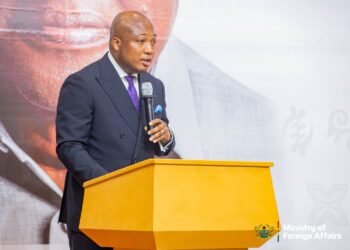Reform UK plans to mimic the Liberal Democrats in building a strong base of councilors and activists, according to its deputy leader, Richard Tice.
Speaking ahead of the party’s annual conference, Tice outlined his strategy for targeting both the Conservative and Labour parties in next May’s local elections.
With a celebratory atmosphere expected in Birmingham, the conference will also see some internal tension, particularly around a proposed new party constitution.
A senior party figure has described the changes as enabling Nigel Farage to act as an “absolute dictator.”
Richard Tice, who has long been a key figure in the party, is optimistic about Reform UK’s future. He believes next May’s local elections will provide an opportunity to capitalize on public dissatisfaction with the two major political parties.
“Not only will the Tories be in disarray, but Labour will be unpopular coming out of a winter when, bluntly, pensioners will have died because of their policies,” Tice said.
He emphasized that targeting these two giants would be central to the party’s efforts, especially as winter fuel crises grip the nation.
A major theme of the conference will be professionalization, with Zia Yusuf, Reform’s new chair, leading the charge. Yusuf, a millionaire businessman, is determined to improve the party’s infrastructure and create new branches to support the ground campaign.
“We’ve got to take professionalism to another whole gear,” Tice remarked, noting that mimicking the Liberal Democrats’ successful grassroots approach will be crucial to building local support. “They’re the best at ground campaigning, and I think we should give credit where it’s due.”
Internal Dissent Over Constitution Changes
However, not all within Reform UK are on board with the party’s internal changes. Ben Habib, who was removed as deputy leader to make way for Tice, voiced concerns about the new party structure.
The party is registered as a limited company, with Nigel Farage holding a majority of shares. This structure, according to critics like Habib, gives Farage too much control. “This is a rehash of a document that was rejected a year and a half ago,” Habib said.
He claims the new constitution would only deepen the party’s “democratic deficit” by giving the leader unchecked power.
Habib highlighted the proposed system where directors would be chosen from a list approved by the leader and significant decisions could be made without consulting the board. “In other words, he can be an absolute dictator,” Habib said.
Despite these concerns, the party leadership insists the new structure will bring about more “democratization” and ensure the party continues to grow.
Nigel Farage, Reform UK’s high-profile leader, continues to attract controversy. Recently, he faced backlash after amplifying far-right conspiracy theories related to the tragic killings of three children in Southport.

Senior Conservatives criticized his comments, accusing him of spreading misinformation. Farage’s commitment as an MP has also come under scrutiny. Representing Clacton-on-Sea, Farage has voted just three times in the Commons since the election and made five speeches in Parliament.
His frequent trips to the US have led some to question his focus on his duties back home.
Tice, however, came to Farage’s defense, dismissing the concerns as overblown. “Nigel’s views are well known, and I almost hardly ever get asked by people about Trump,” Tice said.
While its leadership faces internal dissent and public controversies, the focus remains on expanding its base and professionalizing its efforts. Whether it can achieve these goals will be revealed in the coming months.
READ ALSO: CEO of Chamber of Mines Offers Solutions for Small-Scale Mining


















